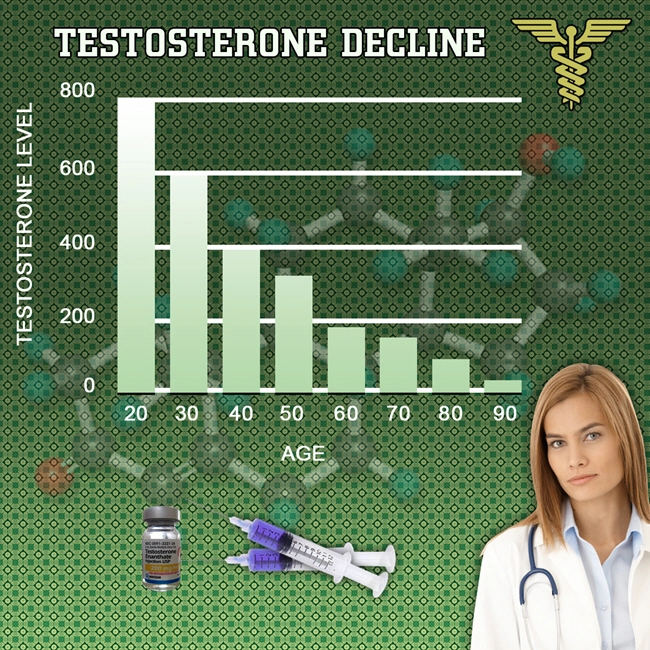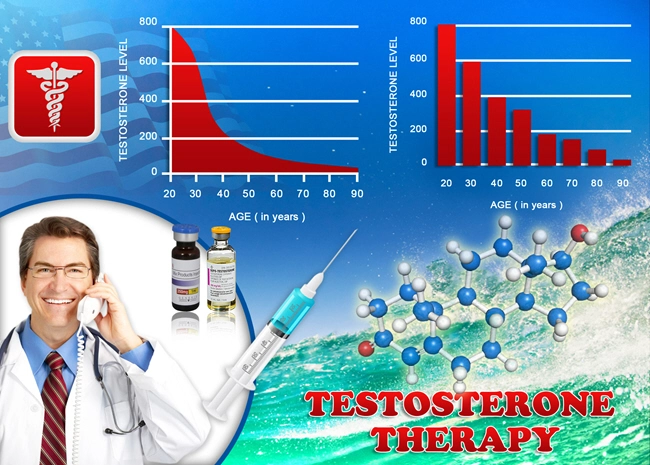
The authors of a recent study determined that "Low-fat diets appear to decrease testosterone levels in men, but further randomized controlled trials are needed to confirm this effect.”
The study comprised 206 healthy men with average testosterone who followed a high-fat diet followed by a low-fat diet. The results showed their mean total testosterone levels were 10% to 15% lower (but still in the normal range) during the low-fat diet.
Registered nutritionist Joseph Whittaker, MSc, University of Worcester, and statistician Kexin Wu, MSc, University of Warwick, Coventry, United Kingdom, conducted the study.
"I think our results are consistent and fairly strong, but they are not strong enough to give blanket recommendations," Whittaker told Medscape Medical News.
 However, "if somebody has low testosterone, particularly borderline, they could try increasing their fat intake, may be on a Mediterranean diet," he said, and see if that works to increase their testosterone by 60 ng/dL, the weighted mean difference in total testosterone levels between the low-fat vs. high-fat diet interventions in this meta-analysis.
However, "if somebody has low testosterone, particularly borderline, they could try increasing their fat intake, may be on a Mediterranean diet," he said, and see if that works to increase their testosterone by 60 ng/dL, the weighted mean difference in total testosterone levels between the low-fat vs. high-fat diet interventions in this meta-analysis.
"A Mediterranean diet is a good way to increase 'healthy fats,' mono- and polyunsaturated fatty acids (MUFAs and PUFAs, respectively), which will likely decrease cardiovascular disease risk, and boost testosterone at the same time," Whittaker noted.
He stressed that Olive oil had been shown to boost testosterone more than butter, reducing Cardiovascular Disease (CVD). Nuts deliver "healthy fats" and continually lower CVD and mortality and might raise testosterone. Other sources of so-called "good fat" in a healthy diet include avocado and red meat, and poultry in reasonable amounts.
"It is controversial, but our results also indicate that foods with saturated fatty acids may boost testosterone," he added, noting, however, that such foods are also associated with an increase in cholesterol.
Is low testosterone (“Low-T”) linked to a sparser diet?
Men require healthy testosterone levels for robust physical prowess, mental health, and sexual health, and diminished testosterone levels are associated with an elevated risk of heart disease, diabetes, and Alzheimer's disease, as per an assertion about this research announced by the University of Worcester.
It is a well-known and proven fact that testosterone levels plummet approximately 10% per decade as men age. However, since nutrition experts began advocating a lower-fat diet in 1965, the drop in testosterone has accelerated.
Fat consumption dwindled from 45% of the diet in 1965 to 35% in 1991 and remained around that lower level through to 2011.
However, it is not definitive that this lesser dietary fat consumption might play a role in the simultaneous plunge in men's testosterone levels.
Whittaker and Wu conducted a systematic literature review. They identified six crossover intervention studies that contrasted testosterone levels during low-fat vs. high-fat diets and then consolidated these studies in a meta-analysis.
Five studies each enrolled 6 to 43 healthy men from North America, the UK, and Scandinavia, and the sixth study (Hill 1980) enrolled 34 healthy men from North America and 39 farmworkers from South Africa.
When combined, the men were 34-54 years old and slightly overweight (a mean body mass index of roughly 27 kg/m2 ) with standard testosterone (i.e., >300 ng/dL, based on the 2018 American Urological Association Guidelines criteria).
Most men consumed a high-fat diet (40% of calories from fat) first, then switched to a low-fat diet (on average 20% of calories from fat; range, 7% to 25%). The  group of men from South Africa received the low-fat diet first.
group of men from South Africa received the low-fat diet first.
To put this into perspective, UK guidelines call for a fat intake of less than 35% of daily calories, and US guidelines suggest a fat intake of 20% to 35% of daily calories.
The low-fat and high-fat interventions ranged from 2 to 10 weeks.
Low-Fat Vegetarian Diets = tumbling testosterone levels
On average, the men's total testosterone was 475 mg/dL when they were eating a low-fat diet and 532 mg/dL when ingesting a high-fat diet.
Conversely, the South African men (Hill 2018 South African) had heightened testosterone levels when they ate a low-fat diet. This illustrates that "men with European ancestry may experience a greater decrease in testosterone in response to a low-fat diet," the researchers concluded.
The drop in total testosterone in the low-fat vs. high-fat diet was most significant (26%) in the two studies of men who partook in a vegetarian diet (Hill 1979 and Hill 1980 North American). These diets may have lacked zinc because even a small zinc deficiency has been demonstrated to decrease total testosterone, Whittaker and colleagues surmised.
The meta-analysis also concluded that levels of free testosterone, urinary testosterone, and dihydrotestosterone atrophied during the low-fat diet. In contrast, levels of luteinizing hormone or sex hormone-binding globulin were commensurate with both diets.
Advice for men With Low-T who are Overweight/Obese
What nutritional guidance should practitioners give to men who have the dangerous conditions of low testosterone and are overweight/Obese?
"If you are very overweight, losing weight is going to improve your testosterone dramatically," Whittaker said.
But there is a problem. Advocates of a seemingly endless array of diets are often downright bickering over the benefits of a low-fat vs. low-carbohydrate diet to lose weight.
"In general," he continued, "the literature shows low carb (high fat) diets are better for weight loss [although many will disagree with that statement]."
Although nutrition guidelines have emphasized the importance of restricting fat intake, fat in the diet is also linked with lower triglyceride levels and blood pressure and higher High-density lipoprotein (HDL), the ("good") cholesterol levels, and in this study, elevated testosterone levels.
As always, more research is needed.
The researchers concede the study limitations: the meta-analysis consisted of just a few small studies with miscellaneous designs and conclusions, and there was possible bias from contradictory variables.
"Ideally, we would like to see a few more studies to confirm our results," Whittaker said in the statement. "However, these studies may never come; normally, researchers want to find new results, not replicate old ones. In the meantime, men with low testosterone would be wise to avoid low-fat diets."
 Even though the jury is still out, all indications point to the benefits of adding additional fat to your nutritional plan.
Even though the jury is still out, all indications point to the benefits of adding additional fat to your nutritional plan.
But not just any type of fat! At our clinic, we believe in and practice a holistic approach. Hormone replacement is our main business. But hormone replacement alone will not maximize your treatments. We will give detailed, specific advice on controlling stress, the importance of sleep, physical fitness, and, of course, nutrition.
There are healthy fats, less than healthy fats, and bad fats. We will cut through the dense fog of nutritional confusion and provide you with the knowledge you need to make smart decisions in all aspects of health.
Contact us for a FREE, no-obligation discussion.
Contact Us Today For A Free Consultation
Dear Patient,
Once you have completing the above contact form, for security purposes and confirmation, please confirm your information by calling us.
Please call now: 1-800-380-5339.
Welcoming You To Our Clinic, Professor Tom Henderson.

- Our HGH Clinic And Web Site Privacy Policy [Last Updated On: May 23rd, 2019] [Originally Added On: December 14th, 2017]
- Idaho HGH Clinics [Last Updated On: August 26th, 2025] [Originally Added On: March 19th, 2018]
- Injectable HGH Prescriptions In Cheyenne, Wyoming [Last Updated On: April 15th, 2025] [Originally Added On: March 3rd, 2019]
- Injectable HGH Prescriptions In Milwaukee, Wisconsin [Last Updated On: April 19th, 2025] [Originally Added On: March 3rd, 2019]
- Injectable HGH Prescriptions In Madison, Wisconsin [Last Updated On: April 1st, 2025] [Originally Added On: March 3rd, 2019]
- Injectable HGH Prescriptions In Green Bay, Wisconsin [Last Updated On: March 22nd, 2025] [Originally Added On: March 3rd, 2019]
- Injectable HGH Prescriptions In Charleston, West Virginia [Last Updated On: May 17th, 2025] [Originally Added On: March 3rd, 2019]
- Injectable HGH Prescriptions In Vancouver, Washington [Last Updated On: February 18th, 2025] [Originally Added On: March 3rd, 2019]
- Injectable HGH Prescriptions In Tacoma, Washington [Last Updated On: January 16th, 2025] [Originally Added On: March 3rd, 2019]
- Injectable HGH Prescriptions In Spokane, Washington [Last Updated On: April 16th, 2025] [Originally Added On: March 3rd, 2019]
- Injectable HGH Prescriptions In Seattle, Washington [Last Updated On: May 30th, 2025] [Originally Added On: March 3rd, 2019]
- Injectable HGH Prescriptions In Washington D.C [Last Updated On: January 15th, 2025] [Originally Added On: March 3rd, 2019]
- Injectable HGH Prescriptions In Bellevue, Washington [Last Updated On: June 1st, 2025] [Originally Added On: March 3rd, 2019]
- Injectable HGH Prescriptions In Virginia Beach, Virginia [Last Updated On: January 18th, 2025] [Originally Added On: March 3rd, 2019]
- Injectable HGH Prescriptions In Richmond, Virginia [Last Updated On: January 25th, 2025] [Originally Added On: March 3rd, 2019]
- Injectable HGH Prescriptions In Portsmouth, Virginia [Last Updated On: April 10th, 2025] [Originally Added On: March 3rd, 2019]
- Injectable HGH Prescriptions In Norfolk, Virginia [Last Updated On: May 28th, 2025] [Originally Added On: March 3rd, 2019]
- Injectable HGH Prescriptions In Newport News, Virginia [Last Updated On: April 12th, 2025] [Originally Added On: March 3rd, 2019]
- Injectable HGH Prescriptions In Hampton, Virginia [Last Updated On: January 11th, 2025] [Originally Added On: March 3rd, 2019]
- Injectable HGH Prescriptions In Chesapeake, Virginia [Last Updated On: January 9th, 2025] [Originally Added On: March 3rd, 2019]
- Injectable HGH Prescriptions In Arlington, Virginia [Last Updated On: February 6th, 2025] [Originally Added On: March 3rd, 2019]
- Injectable HGH Prescriptions In Alexandria, Virginia [Last Updated On: May 24th, 2025] [Originally Added On: March 3rd, 2019]
- Injectable HGH Prescriptions In Montpelier, Vermont [Last Updated On: April 29th, 2025] [Originally Added On: March 3rd, 2019]
- Injectable HGH Prescriptions In West Valley City, Utah [Last Updated On: April 16th, 2025] [Originally Added On: March 3rd, 2019]
- Injectable HGH Prescriptions In West Jordan, Utah [Last Updated On: March 15th, 2025] [Originally Added On: March 3rd, 2019]
- Injectable HGH Prescriptions In Salt Lake City, Utah [Last Updated On: January 28th, 2025] [Originally Added On: March 3rd, 2019]
- Injectable HGH Prescriptions In Provo, Utah [Last Updated On: May 12th, 2025] [Originally Added On: March 3rd, 2019]
- Injectable HGH Prescriptions In Wichita Falls, Texas [Last Updated On: April 1st, 2025] [Originally Added On: March 3rd, 2019]
- Injectable HGH Prescriptions In Waco, Texas [Last Updated On: March 15th, 2025] [Originally Added On: March 3rd, 2019]
- Injectable HGH Prescriptions In San Antonio, Texas [Last Updated On: February 4th, 2025] [Originally Added On: March 3rd, 2019]
- Injectable HGH Prescriptions In Round Rock, Texas [Last Updated On: December 29th, 2024] [Originally Added On: March 3rd, 2019]
- Injectable HGH Prescriptions In Richardson, Texas [Last Updated On: March 10th, 2025] [Originally Added On: March 3rd, 2019]
- Injectable HGH Prescriptions In Plano, Texas [Last Updated On: February 6th, 2025] [Originally Added On: March 3rd, 2019]
- Injectable HGH Prescriptions In Pasadena, Texas [Last Updated On: March 31st, 2025] [Originally Added On: March 3rd, 2019]
- Injectable HGH Prescriptions In Midland, Texas [Last Updated On: April 23rd, 2025] [Originally Added On: March 3rd, 2019]
- Injectable HGH Prescriptions In Mesquite, Texas [Last Updated On: April 9th, 2025] [Originally Added On: March 3rd, 2019]
- Injectable HGH Prescriptions In McKinney, Texas [Last Updated On: May 19th, 2025] [Originally Added On: March 3rd, 2019]
- Injectable HGH Prescriptions In McAllen, Texas [Last Updated On: April 3rd, 2025] [Originally Added On: March 3rd, 2019]
- Injectable HGH Prescriptions In Lubbock, Texas [Last Updated On: May 10th, 2025] [Originally Added On: March 3rd, 2019]
- Injectable HGH Prescriptions In Lewisville, Texas [Last Updated On: January 29th, 2025] [Originally Added On: March 3rd, 2019]
- Injectable HGH Prescriptions In Laredo, Texas [Last Updated On: April 26th, 2025] [Originally Added On: March 3rd, 2019]
- Injectable HGH Prescriptions In Killeen, Texas [Last Updated On: March 4th, 2025] [Originally Added On: March 3rd, 2019]
- Injectable HGH Prescriptions In Irving, Texas [Last Updated On: February 9th, 2025] [Originally Added On: March 3rd, 2019]
- Injectable HGH Prescriptions In Houston, Texas [Last Updated On: April 6th, 2025] [Originally Added On: March 3rd, 2019]
- Injectable HGH Prescriptions In Grand Prairie, Texas [Last Updated On: January 17th, 2025] [Originally Added On: March 3rd, 2019]
- Injectable HGH Prescriptions In Garland, Texas [Last Updated On: February 14th, 2025] [Originally Added On: March 3rd, 2019]
- Injectable HGH Prescriptions In Fort Worth, Texas [Last Updated On: April 21st, 2025] [Originally Added On: March 3rd, 2019]
- Injectable HGH Prescriptions In El Paso, Texas [Last Updated On: February 28th, 2025] [Originally Added On: March 3rd, 2019]
- Injectable HGH Prescriptions In Denton, Texas [Last Updated On: May 6th, 2025] [Originally Added On: March 3rd, 2019]
- Injectable HGH Prescriptions In Dallas, Texas [Last Updated On: December 31st, 2024] [Originally Added On: March 3rd, 2019]
- Injectable HGH Prescriptions In Corpus Christi, Texas [Last Updated On: June 7th, 2025] [Originally Added On: March 3rd, 2019]
- Injectable HGH Prescriptions In Carrollton, Texas [Last Updated On: June 3rd, 2025] [Originally Added On: March 3rd, 2019]
- Injectable HGH Prescriptions In Brownsville, Texas [Last Updated On: February 4th, 2025] [Originally Added On: March 3rd, 2019]
- Injectable HGH Prescriptions In Beaumont, Texas [Last Updated On: April 4th, 2025] [Originally Added On: March 3rd, 2019]
- Injectable HGH Prescriptions In Austin, Texas [Last Updated On: June 5th, 2025] [Originally Added On: March 3rd, 2019]
- Injectable HGH Prescriptions In Arlington, Texas [Last Updated On: January 13th, 2025] [Originally Added On: March 3rd, 2019]
- Injectable HGH Prescriptions In Amarillo, Texas [Last Updated On: March 18th, 2025] [Originally Added On: March 3rd, 2019]
- Injectable HGH Prescriptions In Abilene, Texas [Last Updated On: January 5th, 2025] [Originally Added On: March 3rd, 2019]
- Injectable HGH Prescriptions In Nashville, Tennessee [Last Updated On: March 2nd, 2025] [Originally Added On: March 3rd, 2019]
- Injectable HGH Prescriptions In Murfreesboro, Tennessee [Last Updated On: March 8th, 2025] [Originally Added On: March 3rd, 2019]
- Injectable HGH Prescriptions In Memphis, Tennessee [Last Updated On: March 28th, 2025] [Originally Added On: March 3rd, 2019]
- Injectable HGH Prescriptions In Knoxville, Tennessee [Last Updated On: March 25th, 2025] [Originally Added On: March 3rd, 2019]
- Injectable HGH Prescriptions In Clarksville, Tennessee [Last Updated On: February 2nd, 2025] [Originally Added On: March 3rd, 2019]
- Injectable HGH Prescriptions In Chattanooga, Tennessee [Last Updated On: January 29th, 2025] [Originally Added On: March 3rd, 2019]
- Injectable HGH Prescriptions In Sioux Falls, South Dakota [Last Updated On: December 25th, 2024] [Originally Added On: March 3rd, 2019]
- Injectable HGH Prescriptions In Columbia, South Carolina [Last Updated On: February 2nd, 2025] [Originally Added On: March 3rd, 2019]
- Injectable HGH Prescriptions In Charleston, South Carolina [Last Updated On: January 31st, 2025] [Originally Added On: March 3rd, 2019]
- Injectable HGH Prescriptions In Providence, Rhode Island [Last Updated On: January 30th, 2025] [Originally Added On: March 3rd, 2019]
- Injectable HGH Prescriptions In Pittsburgh, Pennsylvania [Last Updated On: May 18th, 2025] [Originally Added On: March 3rd, 2019]
- Injectable HGH Prescriptions In Erie, Pennsylvania [Last Updated On: January 4th, 2025] [Originally Added On: March 3rd, 2019]
- Injectable HGH Prescriptions In Allentown, Pennsylvania [Last Updated On: May 6th, 2025] [Originally Added On: March 3rd, 2019]
- Injectable HGH Prescriptions In Salem, Oregon [Last Updated On: January 31st, 2025] [Originally Added On: March 3rd, 2019]
- Injectable HGH Prescriptions In Portland, Oregon [Last Updated On: February 1st, 2025] [Originally Added On: March 3rd, 2019]
- Injectable HGH Prescriptions In Gresham, Oregon [Last Updated On: January 30th, 2025] [Originally Added On: March 3rd, 2019]
- Injectable HGH Prescriptions In Eugene, Oregon [Last Updated On: January 27th, 2025] [Originally Added On: March 3rd, 2019]
- Injectable HGH Prescriptions In Tulsa, Oklahoma [Last Updated On: May 26th, 2025] [Originally Added On: March 3rd, 2019]
- Injectable HGH Prescriptions In Oklahoma City, Oklahoma [Last Updated On: February 22nd, 2025] [Originally Added On: March 3rd, 2019]
- Injectable HGH Prescriptions In Norman, Oklahoma [Last Updated On: April 28th, 2025] [Originally Added On: March 3rd, 2019]
- Injectable HGH Prescriptions In Toledo, Ohio [Last Updated On: April 14th, 2025] [Originally Added On: March 3rd, 2019]
- Injectable HGH Prescriptions In Dayton, Ohio [Last Updated On: April 11th, 2025] [Originally Added On: March 3rd, 2019]








